|
|
|
Sort Order |
|
|
|
Items / Page
|
|
|
|
|
|
|
| Srl | Item |
| 1 |
ID:
070157
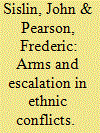

|
|
|
| 2 |
ID:
173364
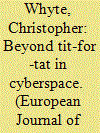

|
|
|
|
|
| Summary/Abstract |
At present, most scholarship on the potential for escalation in cyberspace couches analysis in terms of the technological dynamics of the domain for relative power maneuvering. The result has been a conceptualisation of the logic of operation in cyberspace as one of ‘tit-for-tat’ exchanges motivated by attribution problems and limited opportunity for strategic gain. This article argues that this dominant perspective overlooks alternative notions of how cyber tools are used to influence. This, in turn, has largely led scholars to ignore second-order effects – meaning follow-on effects triggered by a more direct outcome of an initial cyber action – on domestic conditions, institutions, and individual stakeholders. This article uses the case of cyber-enabled political warfare targeting the United States in 2016 to show how escalation can occur as a second-order effect of cyber operations. Specifically, the episode led to a re-evaluation of foreign cyber strategy on the part of American defence thinkers that motivated an offensive shift in doctrine by 2018. The episode also directly affected both the political positions taken by important domestic actors and the attitude of parts of the electorate towards interference, both of which have reinforced the commitment of military planners towards assertive cyber actions.
|
|
|
|
|
|
|
|
|
|
|
|
|
|
|
|
| 3 |
ID:
146264
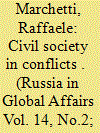

|
|
|
|
|
| Summary/Abstract |
Civil society actors have become key players in conflicts, especially in intra-state ones. This has been facilitated by the transformation of conflicts, increasingly characterized by high-intensity intra-border ethno-religious tensions and strong international influence by proxy. The usual take on conflicts focuses on the role of governmental actors, both national and international. Accordingly, violence and peace are usually considered to be determined above all by the political decisions of official institutions alone. While this remains partly true, in this paper I examine the other side of the coin: the non-governmental component in conflicts. Civil society actors, or as I define them, conflict society organizations, are increasingly central in view of the high degree of complexity of contemporary conflicts. These are conflicts that can only be understood by combining macro with micro approaches that focus on society. It is thanks to the latter approach that it is possible to unpack the political inputs, be they good or bad, which emerge from below, from the civil society domain, and scale up to the top political echelons. This is even more so in societies that are highly fragmented and deprived of stable governing institutions. It is in failing states such as those undergoing an ethno-political conflict that much of politics unfolds "on the ground." Hence it is there, at the micro level, that we need to explore
|
|
|
|
|
|
|
|
|
|
|
|
|
|
|
|
| 4 |
ID:
072682
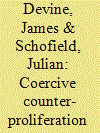

|
|
|
| 5 |
ID:
085439
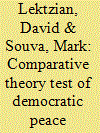

|
|
|
|
|
| Publication |
2009.
|
| Summary/Abstract |
Multiple theories posit the existence of a dyadic democratic peace. The authors extend the logic of three theories of the democratic peace - informational, normative, and preferences - and find that they make different predictions with respect to the onset and escalation of disputes across the range of similar regime dyads. First, regarding dispute onset, the preferences argument, but not the normative and informational arguments, expects autocratic dyads of similar type to have less conflict onset than mixed dyads.
|
|
|
|
|
|
|
|
|
|
|
|
|
|
|
|
| 6 |
ID:
182642
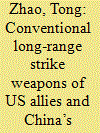

|
|
|
|
|
| Summary/Abstract |
Conventional long-range strike weapons of US allies may exacerbate Chinese concerns about the survivability of its small nuclear arsenal against a precision pre-emptive strike from the US-led coalition, although the degree of the new threat depends on various factors including the numbers and types of such weapons to be deployed. Conventional hypersonic missiles, in particular, may generate acute threat perception, as they can play the role of “door kicker” against China’s so-called anti-access, area-denial capabilities and pave the way for subsequent massive strikes with more traditional weapons. The development of conventional long-range-strike weapons by US allies also affects the risk of conventional conflicts escalating inadvertently to the nuclear level. Such risks are particularly salient in the Asia–Pacific region because of at least two factors: the ambiguous role of Chinese theater nuclear weapons and significant entanglement of conventional and nuclear capabilities at the theater level. Such conventional capabilities of US allies also help shape the region’s overall military balance—something China treats as part of its broader understanding of the term “strategic stability.” Regional players, however, have competing visions about what constitutes a stable military balance. They also have conflicting interpretations of why other parties are pursuing conventional long-range-strike weapons. The development of such capabilities will pose growing challenges to regional strategic stability in the future.
|
|
|
|
|
|
|
|
|
|
|
|
|
|
|
|
| 7 |
ID:
189429
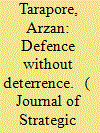

|
|
|
|
|
| Summary/Abstract |
Why does combat success sometimes fail to produce a stable and durable post-war settlement? In the 1965 war, India successfully defended against a Pakistani invasion, but did not improve the long-term security of Kashmir or establish deterrence against Pakistan. I argue that, to deter rivals after war, states must couple battlefield success with credible signals of resolve, such as retaining captured territory or risking a wider war. In 1965, India used both denial and punishment strategies, but both failed to establish post-war deterrence because it judged the necessary signals of resolve to be too costly.
|
|
|
|
|
|
|
|
|
|
|
|
|
|
|
|
| 8 |
ID:
183999
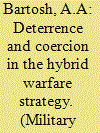

|
|
|
|
|
| Summary/Abstract |
This paper conducts a comparative analysis of the role and significance of deterrence and coercion as elements of the hybrid warfare strategy against Russia. It proposes certain measures for countering such threats.
|
|
|
|
|
|
|
|
|
|
|
|
|
|
|
|
| 9 |
ID:
143682
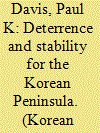

|
|
|
|
|
| Summary/Abstract |
Most trends on the Korean Peninsula favor South Korea, but North Korea’s nuclear program is a great concern, as is the possibility that the North will become desperate at some point because of negative trends. Although unlikely, war—even limited nuclear war—is imaginable in the years ahead, perhaps with winners and losers. This poses challenges for strategic planning. RAND and KIDA have been conducting a collaborative research addressing this issue and this paper is the output of the first year’s research. The first section of this paper reviews and extends strategic theory and lessons from the Cold War by drawing on classic papers and more recent literature, the principal author’s experiences with U.S. strategic planning, recently declassified materials, history, and psychological research. This is followed by a section that outlines the challenges for deterrence salient to Korea today, particularly ways in which deterrence could fail, using historical cases. The final section discusses implications for Korea, highlighting the need to think through how South Korea should consider its new military capabilities and the need to strengthen U.S. extended deterrence. Complacency regarding both matters would be dangerous. Deterrence could fail for such reasons as misperceptions, misunderstanding the adversary, other aspects of limited rationality, and accidents. Further, the challenges for extended deterrence are much greater than earlier, as are those in achieving balance in planning.
|
|
|
|
|
|
|
|
|
|
|
|
|
|
|
|
| 10 |
ID:
177041
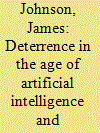

|
|
|
|
|
| Summary/Abstract |
How might nuclear deterrence be affected by the proliferation of artificial intelligence (AI) and autonomous systems? How might the introduction of intelligent machines affect human-to-human (and human-to-machine) deterrence? Are existing theories of deterrence still applicable in the age of AI and autonomy? The article builds on the rich body of work on nuclear deterrence theory and practice and highlights some of the variegated and contradictory – especially human cognitive psychological – effects of AI and autonomy for nuclear deterrence. It argues that existing theories of deterrence are not applicable in the age of AI and autonomy and introducing intelligent machines into the nuclear enterprise will affect nuclear deterrence in unexpected ways with fundamentally destabilising outcomes. The article speaks to a growing consensus calling for conceptual innovation and novel approaches to nuclear deterrence, building on nascent post-classical deterrence theorising that considers the implications of introducing non-human agents into human strategic interactions.
|
|
|
|
|
|
|
|
|
|
|
|
|
|
|
|
| 11 |
ID:
185312
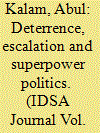

|
|
|
| 12 |
ID:
150993
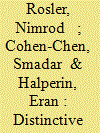

|
|
|
|
|
| Summary/Abstract |
The goal of the current research was to examine how discrete positive intergroup emotional phenomena affect conflict-related attitudes in different contexts of intractable conflict. We hypothesized that empathy, but not hope would be negatively associated with aggressive attitudes during escalation, while hope, but not empathy would be associated with conciliatory attitudes during de-escalation. In study 1, we examined our hypotheses within a correlational design in an emotion-inducing context, while in study 2 a two-wave survey was conducted during real-life events within the context of the Israeli–Palestinian conflict; a peace summit as well as a war. Both studies supported our hypotheses, thus indicating the unique, yet complimentary, contribution of each of the two emotional phenomena to the advancement of peace.
|
|
|
|
|
|
|
|
|
|
|
|
|
|
|
|
| 13 |
ID:
167672
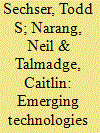

|
|
|
|
|
| Summary/Abstract |
Recent commentary has sounded the alarm about the effects of emerging technologies on strategic stability, yet the topic has received relatively little systematic scholarly attention. Will emerging technologies such as cyber, autonomous weapons, additive manufacturing, hypersonic vehicles, and remote sensing make the world more dangerous? Or is pessimism unwarranted? In this volume, we leverage international relations scholarship, historical data, and a variety of methodological approaches to discern the future implications of new technologies for international security. The findings suggest that new technologies can have multiple, conditional, and even contradictory effects on different aspects of strategic stability, and raise a host of important questions for future research.
|
|
|
|
|
|
|
|
|
|
|
|
|
|
|
|
| 14 |
ID:
167678
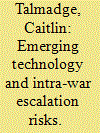

|
|
|
|
|
| Summary/Abstract |
Will emerging technologies increase the risk of conflict escalation? This paper develops a framework for evaluating the role of technology in different types of intra-war escalation. It then uses the framework to probe empirically the possible role of technology in escalation through three carefully chosen cases from Cold War. The findings largely cast doubt on the idea of emerging technologies as an independent, primary driver of otherwise avoidable escalation, suggesting instead that technology more likely functions as an intervening variable – a sometimes necessary, but rarely sufficient, condition for escalation. The conclusion explores the implications of this analysis for the future.
|
|
|
|
|
|
|
|
|
|
|
|
|
|
|
|
| 15 |
ID:
191058
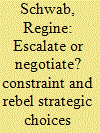

|
|
|
|
|
| Summary/Abstract |
Theories of interaction among rebel groups in civil wars, like other works in the armed conflict literature, continue to see force as foundational to the trajectory and outcome of conflict. But evidence from inter-rebel conflicts in the Syrian war, which has been one of the major civil wars of our times, shows that military force is not always the preferred tool even in situations where violence is presumably cheap: in conflicts between dominant rebel groups and weaker rivals. Rather than using force, Jabhat al-Nusra, one of the strongest groups in the Syrian conflict, frequently chose to negotiate with rivals. Existing theories of inter-rebel conflict fail to explain such variation in responses. As an explanation of this puzzle of non-force, I argue that the constraint emanating from the conflict with the main enemy determines rebels’ strategies towards rivals. To investigate this argument, the paper draws on the triangulation of original data on inter-rebel conflicts in Syria, encompassing written agreements between Jabhat al-Nusra and other rebel groups, a database of important military operations in the Syrian civil war since 2011, and interviews with civil and military participants in the insurgency. The findings have important implications not only for our understanding of inter-rebel dynamics in the Syrian conflict but also for other complex civil wars concerning the relationship between inter-rebel negotiation, cooperation, success, and war duration.
|
|
|
|
|
|
|
|
|
|
|
|
|
|
|
|
| 16 |
ID:
115214
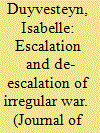

|
|
|
|
|
| Publication |
2012.
|
| Summary/Abstract |
The introduction sets out the theme of the special issue. It introduces the topic of escalation by discussing the current state of the art in the literature and it outlines the set up of the remainder of the issue.
|
|
|
|
|
|
|
|
|
|
|
|
|
|
|
|
| 17 |
ID:
115220
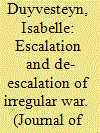

|
|
|
|
|
| Publication |
2012.
|
| Summary/Abstract |
The final contribution brings together the main findings of the individual articles, draws conclusions and formulates future research challenges in regards to understanding the escalation and de-escalation of irregular war.
|
|
|
|
|
|
|
|
|
|
|
|
|
|
|
|
| 18 |
ID:
119498
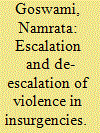

|
|
|
|
|
| Publication |
2013.
|
| Summary/Abstract |
Insurgencies in the Northeast of India have been a recurring phenomenon since India's independence in 1947. One of the most significant aspects of the multiple insurgencies has been the use of violence for political goals. By drawing upon three cases of insurgencies in Northeast India, the article offers a conceptual framework on escalation and de-escalation of violence in insurgencies. The article argues that the most critical variables which have a direct bearing on the levels of insurgent violence are: popular support, loss of legitimacy and the state's counter-response.
|
|
|
|
|
|
|
|
|
|
|
|
|
|
|
|
| 19 |
ID:
115216
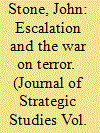

|
|
|
|
|
| Publication |
2012.
|
| Summary/Abstract |
This article makes a case for treating escalation in irregular warfare as different in kind from the regular variant that was originally theorized during the Cold War. The regular variant emphasizes the role of clearly defined and commonly recognized `thresholds' as a means of organizing cooperation within conflict. In contrast, the irregular variant can reward efforts by weaker terroristic actors to erode the moral significance of the combatant/non-combatant threshold, just as it can reward efforts by their stronger adversaries to bolster it.
|
|
|
|
|
|
|
|
|
|
|
|
|
|
|
|
| 20 |
ID:
115215
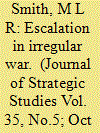

|
|
|
|
|
| Publication |
2012.
|
| Summary/Abstract |
If all violence is intended to achieve political effects, what is distinctive about escalation in irregular war? Indeed, what is irregular war? To answer such fundamental questions this analysis employs the principles of strategic theory in an attempt to offer a theoretical and practical framework that will facilitate an appreciation of the subsequent contributions to this special issue. The assessment seeks to articulate how the escalation process in conditions of so-called irregular war might be conceptualized and, via examples, illustrate how certain broad observations may be held to be true. Ultimately, though, the argument emphasizes that the process of escalation cannot be distinctive or follow predictable patterns given that all wars are unique to their time and place and will be affected in their conduct by the contingent forces of passion, chance and reason.
|
|
|
|
|
|
|
|
|
|
|
|
|
|
|
|
|
|
|
|
|